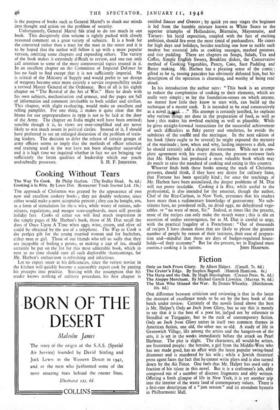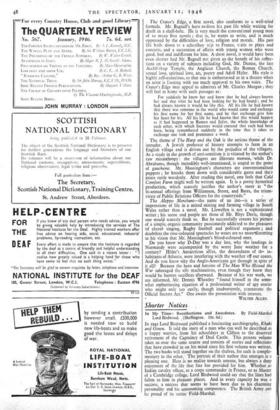Fiction
10s. 6d.)
ONE difference between criticism and reviewing is that in the latter the measure of excellence tends to be set by the best book of the batch under review: Certainly of the novels listed above the best is Mr. Halper's Only an Inch from Glory, but to say this is merely to say that it is the best of a poor lot, judged not by reference to Stendhal or Turgeniev, but to the ruck of contemporary fiction. Only an Inch from Glory unites in itself two common themes in American fiction, one old, the other not so old. A study of life in Greenwich Village life among the artists and the hangers-on of the arts, it is set in the weeks immediately before the attack on Pearl Harbour. The plot is slight. The characters all would-be artists, are frustrated people: the heroine, a girl from characters, Middle-West who has not made good, has an affair with the latest popular swing-band drummer and is murdered by his wife ; while a Jewish theatrical press agent faces thelact that he cannot write plays and is also turned down by the Air Force. One feels that Mr. Halper has used only a fraction of his talent in this novel. But it is a craftsman's job, ably
composed out of a number of discreet fragments and ably written. Offering a fresh glimpse of life in New York, it is yet another trip into the interior of the waste land of contemporary values. There is a first-rate description of a "jam session" and its attendant hysteria in Philharmonic Hall. The Crater's Edge, a first novel, also conforms to a. well-tried ,formula. Mr. Bagnall's hero re-lives his past life while waiting for death in a shell-hole. He is very much the conventional young man of so many first novels ; that is, he wants to write, and is much • oppressed by the difficulties of love, religion and morals. His past life boils down to a schoolboy trip to France, visits to plays and concerts, and a succession of affairs with young women who were • good, bad and indifferent for him. A short novel, it would have been even shorter had Mr. Bagnall not given us the benefit of his reflec- tions on a variety of subjects including God, Mr. Dunne, the late Archbishop Temple, the Anglican Church, the Roman Church; • sexual love, spiritual love, art, poetry and Adolf Hitler. His style is highly ,self-conscious, so that one is embarrassed as in a theatre when
• an actor is lisening with too much approval to his own voice. The Crater's Edge may appeal to admirers of Mr. Charles Morgan ; they will feel at home with such passages as: For suddenly he knew her and knew that he had alwayrknown her and that what he had been looking for he had found and he had always known it would be like this. All his life he had known that there was someone in the world who would come and exchange his first name for her first name, and by that exchange give him her heart for his. All his life he had known that this would happen as it had happened to Romeo and Juliet, the whole, knowledge of each other, with which Socrates would contend that each had been born, being remembered suddenly in the time that it takes to exchange one look and pronounce a word.
'The theme of The Harp and the Oak is the serious theme of the intruder. A Jewish professor of history attempts to farm in an English village and is driven out by the prejudice of the villagers. As a study in the grOwth of anti-serraism it is vitiated by the author's raw misanthropy : the villagers are illiterate morons, .while Dr. Abrahams, though incredibly well-intentioned, is stupid to the point of gaucherie. Mr. Massingham's characters are conventionalised puppets ; he knocks them down with considerable gusto and their joints rattle woodenly. After reading this novel, one feels that Cold Comfort Farm might well be written again. It is a pretty hysterical production, which scarcely justifies the author's sneer at "the bi-annual offerings from Williamson Street, and Bates, the trium- virate of Public Relations Officers for Williamson, countryside."
The Aleppo Merchant—the name of an inn—is a series- of
impressions of life in a mixed mining and farming village in South Wales rather than a novel. Mr. Llewellyn is not a sophisticated writer ; his scene and people are those of Mr. Rhys Davis, though one would scarcely think so: But he successfully creates his' picture of a simple, organic community passionately addicted to the pleasures id choral+ singing, Rugby football and political argument ; and doubtless the rose-coloured spectacles he wears are no more tlistorting to his vision that Mr. Massingham's blood-coloured ones.
Do you know why D-Day was a day late, why• the landings in Normandy were accompanied by the worst June weather for a century? Hitler's Antarctican allies, the descendants of tlyt in- habitants of Atlantis, were interfering with the weather off our coatis. And do you know why the Anglo-Americans got through in spite of it all? Because the hero and heroine of The Man Who Missed the War sabotaged the vile machinations, even though they knew they would be human sacrifices afterward. Because of his war work, we are informed, Mr. Dennis Wheatley "found himself in the some- what embarrassing sityation of a professional writer of spy stories who might only too easily, though inadvertently, contravene the Official Secrets Act." One awaits the prosecution with intereit..
WALTER ALLEN.































 Previous page
Previous page